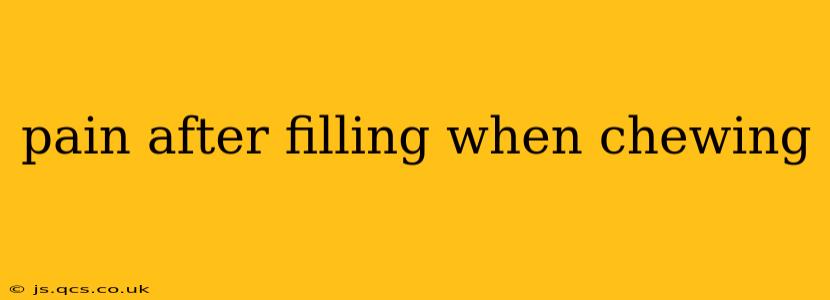Experiencing pain after a dental filling, especially when chewing, is a common concern. While it's often temporary and resolves on its own, understanding the potential causes and when to seek professional help is crucial. This comprehensive guide will explore the reasons behind post-filling pain, effective treatments, and preventive measures to ensure a comfortable recovery.
Why Does My Filling Hurt When I Chew?
Post-filling pain when chewing can stem from several factors. Let's delve into the most common causes:
-
Irritation of the tooth: The filling procedure itself can cause temporary irritation to the tooth's nerve. This sensitivity is usually mild and subsides within a few days. The act of chewing can exacerbate this initial irritation.
-
High filling: If the filling is placed too high, it can interfere with your bite, putting pressure on the tooth and causing pain when chewing. This is a common cause of discomfort and requires adjustment by your dentist.
-
Infection: In rare cases, an infection can develop beneath the filling. This would typically manifest as throbbing pain, possibly accompanied by swelling or sensitivity to temperature changes. This requires immediate dental attention.
-
Cracked tooth: Sometimes, a filling is placed on a tooth that already has a crack. The filling procedure, or the act of chewing, can further stress the cracked tooth, leading to significant pain.
-
Gum irritation: The process of placing a filling might lead to temporary gum irritation. While not directly related to the filling itself, this can cause discomfort, especially during chewing.
-
Sinus infection: In upper molars, pain might be referred from a sinus infection. It's vital to distinguish between sinus pain and tooth pain as they can present similar symptoms.
What to Do If My Filling Hurts When I Chew
If you experience pain after a filling, here's what you should do:
-
Over-the-counter pain relievers: Ibuprofen or acetaminophen can help manage mild to moderate pain. Always follow the recommended dosage.
-
Soft foods: Stick to soft foods that require minimal chewing pressure to reduce the stress on the affected tooth.
-
Avoid extreme temperatures: Limit consumption of extremely hot or cold foods and drinks, as they can further irritate the sensitive tooth.
-
Gentle rinsing: Rinse your mouth gently with salt water several times a day. This can help keep the area clean and reduce inflammation.
-
Contact your dentist: If the pain is severe, persistent, or accompanied by other symptoms like swelling or fever, contact your dentist immediately.
How Long Should Pain After a Filling Last?
The duration of pain after a filling varies. Mild discomfort usually subsides within a few days. However, persistent or worsening pain warrants a visit to your dentist. Any pain lasting longer than a week should be evaluated professionally.
Can a Dentist Fix Pain After a Filling?
Yes, absolutely. Your dentist can assess the cause of your pain and take appropriate measures. This might involve:
-
Adjusting the filling: If the filling is too high, the dentist can adjust it to restore proper bite alignment.
-
Replacing the filling: If the filling is defective or if an infection is present, it might need to be replaced.
-
Root canal: In cases of severe infection or damage to the tooth's nerve, a root canal might be necessary.
-
Extraction: In severe cases of irreparable damage, extraction of the tooth may be the last resort.
How Can I Prevent Pain After a Filling?
Preventing pain after a filling involves choosing a reputable dentist and following post-operative instructions carefully. This includes maintaining good oral hygiene, avoiding hard or sticky foods initially, and promptly reporting any concerning symptoms.
Is Pain After a Filling Normal?
Mild, temporary discomfort is relatively normal following a filling procedure. However, severe, persistent, or worsening pain is not. It's always best to err on the side of caution and contact your dentist if you have any concerns. Don't hesitate to reach out; early intervention often prevents more extensive and costly treatments.
This information is intended for general knowledge and informational purposes only, and does not constitute medical advice. It is essential to consult with a qualified healthcare professional for any health concerns or before making any decisions related to your health or treatment.
